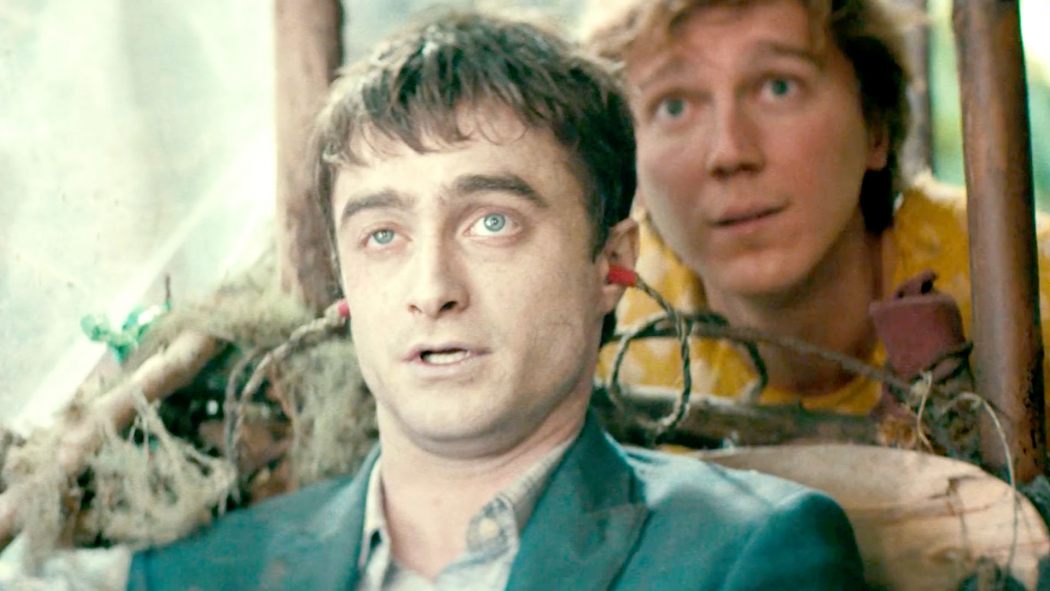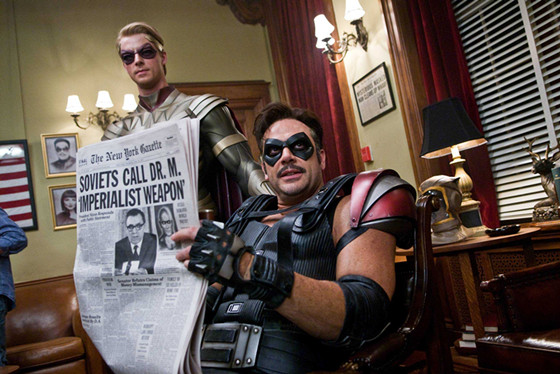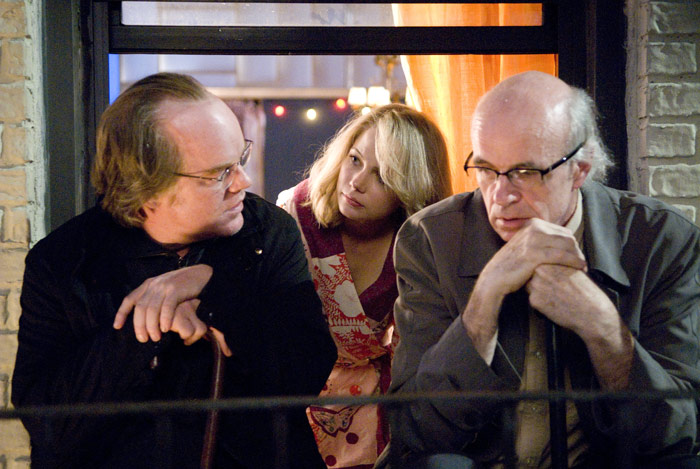5. It’s Only the End of the World (RT Score: 44%)

In the realm of cinema where slow pace and wides are the norm, Dolan brings a flair of vibrant intensity along with his young age to the arthouse with this criminally underrated gem of his filmography.
Sure, the inherent melodramatic qualities of the narrative isn’t what one would even consider remotely profound, as a matter of fact, though properly conveying the complexities of the character, the development of events come across as rather weak and unrealistic, moving at an unreasonably quick pace despite very little inciting moments.
But then again, is it really considered “unrealistic” in the context of a dysfunctional family? A family “betrayed” and left to their own devices by the one son that made it big but refused to acknowledge the individuals that made him who he was? A family that is expected to meet that same prodigal son with warm arms once he decides to return?
When the melodrama is put in that context, it reaches a heightened state of logic. The entire film is set in the perspective of the protagonist, Louis. He’s an observer, though not an omniscient one. He listens, as established in the recurring motif of ears. But he doesn’t see. He’s intrinsically self-centered, even without saying a single word. That whole big secret of his impending death, the secret left unspoken up until the end, is often forgotten in the context of the film, removing any semblance of reason not only on his part, but the other characters.
But who’s to say, his family doesn’t know? There certainly are clues littered throughout implying otherwise. Perhaps this is grief personified. Louis’s family knows, they just refuse to accept it, dealing with the fact with many seemingly absurd mannerisms. Viewing the entirety of the film without ever forgetting that fact and the hinted one certainly gives reason for all the occurring melodrama and all the character quirks.
If the melodrama still appears inherently off-putting, just consider that the narrative is certainly not the film’s strong suit, it lies in Dolan’s experimental direction. By taking the additional role as an editor, he has complete control of the shots used, and adopting mostly single close-ups, aside from having that artistic aspect of isolation, characters trapped in a bubble of their own problems, disconnected from the rest of the seemingly tightly-knit family, has a psychological feeling of claustrophobia.
Arthouse cinema often opts for long, unwavering wides, rarely adopting quick back-and-forth tight shots between characters in conversations. This film refused that norm, and ventured in a direction for more subjective and personable, making every little bit of emotion and character thought ever so clear and impactful.
All in all, the world needs to do better than giving this film a 44% on Rotten Tomatoes. Though certainly not a perfect film, but a subjectively good one, adopting extremely unconventional practices to alleviate the stale, overused concept of a family drama, it certainly has that mark of an auteur to boast.
4. Swiss Army Man (RT Score: 69%)

Swiss Army Man offers a unique outlook on life, an outlook from the eyes of a recluse- An individual with severe confidence issues and completely detached from society, though having a clear understanding of the norms that govern it.
The film recounts the journey of Paul Dano’s Hank, as he, after an undisclosed mishap, is stranded on a seemingly deserted island, and, along with Daniel Radcliffe’s Manny, a farting corpse, has to find his way back to civilization. But does he really want to? Perhaps he’s more inclined to stick in his own bubble for the rest of his days, with his place in the world becoming more and more apparent as he attempts to educate Manny on societal norms.
By having a character seemingly teach another on what they perceive to be right, it not only is an easy way to deliver exposition, but one that reveals so much about their individual personalities, even if Manny is just a farting corpse.
Many critics deem the film “juvenile” and “immature”, calling it nothing but a pretentious mess filled with fart jokes and slapstick humor. They aren’t exactly wrong in their interpretation. But just consider the filmmakers behind the Swiss Army Man. They’re the same minds that brought the insane music video for DJ Snake’s “Turn Down for What” to the world.
Do you really think such individuals are capable of making a film even remotely pretentious? And is “immature” humor really inapt? The Swiss Army Man executed this immaturity to complete perfection, and individuals who dislike it ironically reinforce the film’s innate theme of self-confidence, or a lack thereof, because Radcliffe’s character isn’t some mere exposition or joke machine, he’s a personification of Hank’s and our own inherent desire to break free from societal expectations. Our internal self-viewing the unnecessarily “prim and proper” modern society with nihilistic disdain. Our farting corpse of a soul.
The two individual’s journey of self-discovery, especially towards the end, came across as not only surprisingly philosophical, offering a much needed reflection into the ironic absurdities of our culture and also ourselves, but also provide an extremely heartfelt “buddy” kind of adventure.
The cinematography and editing style, though certainly not the film’s strongest suit, adds to the overall light-hearted, slightly surreal mood of the film, with interesting compositions littered throughout as well as a rapid, almost humorous method of editing. The soundtrack however, is where the comedy shines. It not only fits as a beautiful accompaniment to the zaniness of the film, but a slight inspection would reveal absolutely hilarious deadpan lyrics, satirizing popular songs as well as brilliantly mirroring the events on screen.
The film both delivers as a thought-provoking statement on society and a humorous slapstick feel-good comedy. Anyone that views this film as nothing more than “immature farting corpse nonsense”, though not strictly incorrect in their assessment, should take some time to ask themselves “so what if it is?”
3. Watchmen (RT Score: 64%)

With the current state of DCEU, Zack Snyder has gained much controversy among critics and audiences alike as a hack, someone who’s clearly incapable of handling such a gargantuan franchise. Though that fact may very well be true, it’s undeniable that a little under a decade prior, he did prove himself with the best comic-book film in existence, the epic, with a runtime of over 3 hours, Watchmen.
The innate problem with most comic book films is the fact that they follow a formula that’s tried and tested, a formula that everyone is fully aware works. A formula that’s safe and quite frankly, boring. Though the films that Marvel churn out attain both critical and commercial acclaim, it’s no denying that if one were to strip down every film to their bare essentials from a narrative standpoint, they would almost be indistinguishable. Which was why Watchmen came across as a much needed breath of fresh air from the norm.
In its insane, yet warranted runtime, Watchmen delivers not only as a brilliant superhero film, with gritty reimaginings of classic heroes like Superman and Batman, grounding the very fundamentals of these characters to tell a powerful story, one that’s built on the unique shoulders of the Cold War, telling not only an engaging and entertaining superhero story, but one that delivers on a philosophical level, exploring ideas of hate and fear, on a level much deeper than a superficial one, all packaged nicely in the elusive subgenre of alternate history, and one complemented with Snyder’s unique visual style, which, perhaps for the only time ever, matches perfectly.
2. Fear and Loathing in Las Vegas (RT Score: 49%)

Never before has a film properly capture what it means to be under heavy influence of drugs, it encapsulates everything, from the crazy hallucinations, the abstract disjointness of the conscious mind, the paranoia, everything is reflected in varying degree of content, cinematography and art direction. The argument most often heard of the film is its lack of a coherent plot, and the fact that its events seem repetitive and without purpose.
Though repetitive at its core, the film does make an effort to provide some degree of variety, through not only the subtle differences on content to reflect the various stages of the characters’ psyches but also the technical aspects, especially the wonderful set design, which though seeming chaotic at a glance, is in fact extremely meticulous, with Gilliam paying close attention to color palettes and visual motifs, all while creating a world accurately mirroring the effects of hallucinogenic influence, complete with claustrophobic clutter, hyperbolic motifs and subtle surrealism.
The film, though a full-fledged Python-inspired surreal abstract comedy, has strong underlying philosophical themes beyond its quirkiness. Fear and Loathing in Las Vegas is one grand statement on the entire idea of the counterculture era as a whole, and though the novel the film is adapted from directly commentates on that era, this film, released more than 2 decades later, offers a satirical outlook to the zeitgeist of that iconic age, how people constantly chase the high they once had during the forced carefree period of a post-Cold-War world.
This idea is explored through the film’s innate melancholic and hedonistic ideals, and never through anything blatantly obvious, it’s a theme to complement the story, not the other way around, and it’s extremely fitting considering the character’s distorted perception of the world. They don’t want to focus on the harsh reality, they want to live in blissful ignorance, no matter the means they have to take in pursuit of that fact.
This reason is also precisely why people “loathe” Fear and Loathing in Las Vegas. Nothing is made clear. Storytelling elements are constantly complementing and bouncing off one another, but that’s the beauty of the film.
1. Synecdoche, New York (RT Score: 69%)

Charlie Kaufman is undoubtedly one of, if not the greatest scriptwriter who have ever lived, and thankfully, still living, in the entire world. He’s able to consistently produce work of such immense quality, not only offering surreal self-reflexive experiences, but works that are layered with so much unbelievable depth to them, tapping into the deep recesses of the human psyche unlike any other.
In a realm of writers and filmmakers who strive for audience engagement, for some level of entertainment or profundity, Kaufman says “F**k that” and does whatever he wants, and it more than definitely turns out to be something beyond phenomenal. His directorial debut is perhaps the greatest illustration of his craft – a haunting amalgamation of all his previously explored themes and concepts. Essentially the first time ever where he has 100% creative control and a true testament to his prowess.
Aside from being one of the best films personifying the struggles of an artist and the creative process, what’s especially unique about Synecdoche, New York, is its structure, and what it all means as a whole. Understanding what the film is and knowing Kaufman’s intent would essentially dispel any and all criticism vetted to the film. This is life. Life compressed into 2 hours. Life perceived by an artist, by an artist.
It’s an abstract experience, for sure, but this is surely not a film to be taken literally, it’s a film to be felt, one that forces you to tap into the disjointed mess that is your own mind. It expects you to think. Failing to do so would undoubtedly result in an experience that’s neither profound nor entertaining, but instead, pretentious. But doing so would ensue one of the greatest pieces of cinema you would have ever seen.
Consider the metaphysical nature of the film. This is a film that takes place entirely in the mind of the main character, Caden Cotard, and by extension, Kaufman himself. Every character, one way or another, represents some part of him, a fact that is quite frankly, rather blatant, but still nonetheless easy to overlook without a clear understanding of the film’s intent. It also constantly bombards audiences with philosophical discussions, some in the form of fleeting thoughts with minor interactions of such characters.
It’s a tiring, depressing, and ultimately heavy experience that questions our mortality, our ego, in the most nihilistic and cynical of ways, but yet one that’s ultimately honest, brutally honest. One that dares to tell us that what we do in our lives would result into nothing. One that screams at our inflated, pretentious egos and our inability to make coherence of it all. One that insults our lack of understanding of the world around us and the people that inhabit it. One that provides countless questions and no answers, because there is none.
This is a film that frankly cannot be interpreted how you would any other film, which was a mistake committed by many a misguided critic. If one were to truly approach the film in that fashion, it’s a terrible one. There is no structure. Characters are undeveloped. Pacing is inconsistent. Continuity errors are rife. The list quite frankly can go on and on. But this isn’t a film, this is your life, and this is also your death, photographed and captured in the most haunting and poetic of ways possible.
Author Bio: Zach Wee is a film student from Singapore. Apart from being an aspiring filmmakerr, Zach has a strong passion for cinema and manages the website of his school’s film club, where he edits and also submits weekly film reviews.